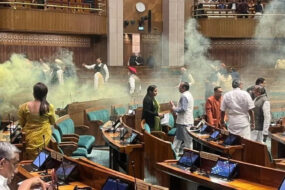
New Delhi, January 12, 2024: The conviction of Congress leader Rahul Gandhi in a defamation case has thrown his political career into limbo and triggered a heated debate about legal interpretations and parliamentary disqualification norms. While Gandhi secured bail, legal experts and analysts warn that the MP court’s verdict may automatically disqualify him from Parliament under the provisions of the Representation of the People Act, 1951.
The court case stemmed from a 2019 campaign speech where Gandhi allegedly made defamatory remarks against then Bharatiya Janata Party (BJP) president Amit Shah. The MP court’s verdict sentencing him to two years imprisonment becomes crucial in light of Article 102(1)(e) of the Constitution, which disqualifies an MP if convicted for offenses punishable with imprisonment for two or more years.
The Disqualification Dilemma:
Despite bail, legal experts argue that the conviction itself triggers automatic disqualification under Article 102(1)(e). The Supreme Court, in a previous case, ruled that conviction, not sentencing, forms the basis for disqualification. Therefore, according to this interpretation, Gandhi’s seat in Parliament stands potentially vacated from the date of the verdict.
However, a counter-argument suggests that disqualification remains in abeyance until the appeal process is exhausted. Gandhi’s legal team has already challenged the conviction in the Gujarat High Court. If the High Court upholds the conviction, the disqualification becomes automatic. If it overturns the conviction, Gandhi retains his seat.
Uncertain Political Future:
This legal limbo casts a shadow over Gandhi’s political future. The Congress party faces the possibility of losing a pivotal leader as it gears up for upcoming state elections and the 2024 general elections. Gandhi’s supporters argue that the disqualification, if it occurs, would be politically motivated and an attack on democracy.
National Debate Ignites:
The case has sparked a nationwide debate on the interplay between criminal justice, politics, and parliamentary ethics. The issue of automatic disqualification versus waiting for the appeal process to conclude raises questions about fair representation and legal loopholes.





















